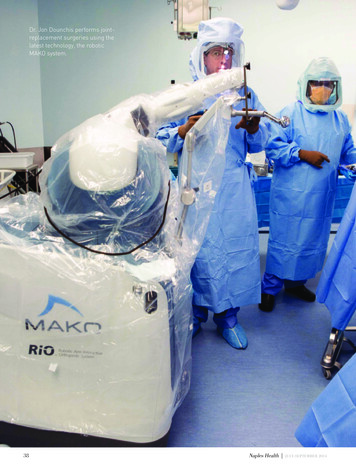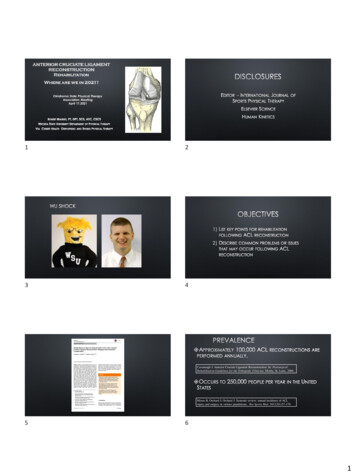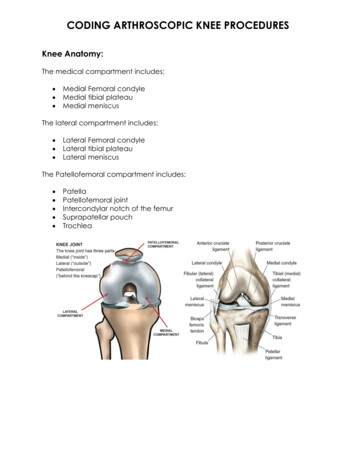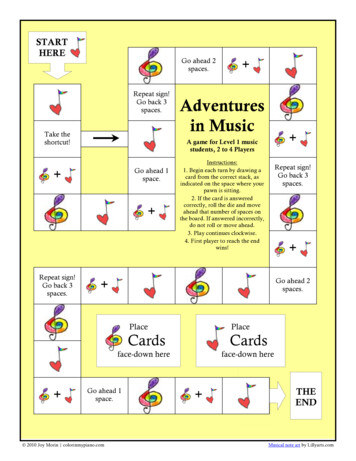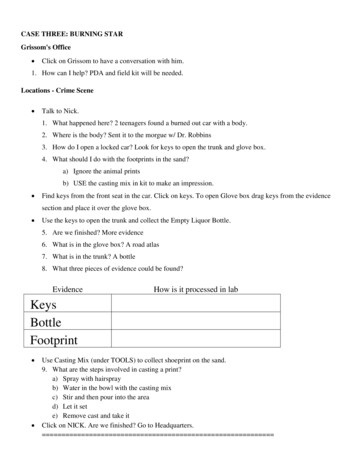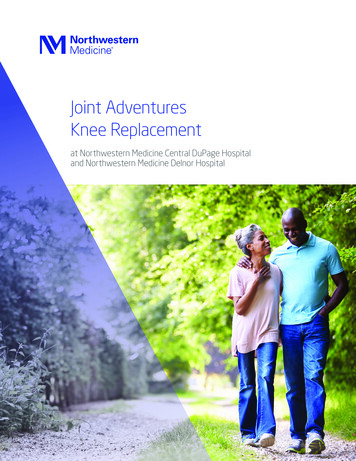
Transcription
Joint AdventuresKnee Replacementat Northwestern Medicine Central DuPage Hospitaland Northwestern Medicine Delnor Hospital
Welcome to Northwestern MedicineHello and welcome to the Joint Adventures Pre Op program at Northwestern Medicine Central DuPage Hospital andNorthwestern Medicine Delnor Hospital. By now you’ve met with an orthopaedic surgeon and set a date for your jointreplacement surgery.From this point on, the orthopaedic care team will be with you every step of the way. We lookforward to giving you excellent care and service.Two important things to do before your surgery are to read this book and attend a Joint Adventures class. The informationin this book, plus much more, will be covered in detail during the class. Knowing what to do before your surgery and knowing what to expect afterwards can help reduce the stress or fear you might have.Besides reading this book and attending a class, you may also be advised to watch a web-based Emmi education programabout your joint surgery. Your surgeon’s office can provide you with the web address and access code you’ll need to viewthe video. Please contact your surgeon’s office for this information.Most of the questions you might have today should be answered after reading this book, watching the Emmi video andattending a Joint Adventures class. If you still have questions about your surgery schedule, physician appointments ormedication, please call your physician’s/surgeon’s office. For other questions, please contact me directly using my cellphone number listed below.Again, welcome to Central DuPage Hospital and Delnor Hospital. The orthopaedic care team looks forward to helping makeyour joint adventure a pleasant one.Sincerely,Linda Abella, MSN, RN, ONCOrthopaedic Nurse NavigatorJasmin J. Buthman, RN, BSN, ONC, TNCCOrthopaedic Nurse 33.6685630.938.2114630.208.4218TTY for the hearing impaired 630.933.48331
2
Table of contentsGetting StartedHealth and NutritionAbout your knee . . . . . . . . . . . . . . . . . . . . . . . . . 6Calcium . . . . . . . . . . . . . . . . . . . . . . . . . . . . . . 16Arthritis . . . . . . . . . . . . . . . . . . . . . . . . . . . . . . . . . . . . . . . . . . . 7Vitamin D. . . . . . . . . . . . . . . . . . . . . . . . . . . . . 18Knee replacement . . . . . . . . . . . . . . . . . . . . . . . . 7Day of SurgeryPreparing for SurgeryPhysician visits and lab tests. . . . . . . . . . . . . . . . 10Arrival and parking. . . . . . . . . . . . . . . . . . . . . . . 20Check-in and registration. . . . . . . . . . . . . . . . . . . 20Waiting room. . . . . . . . . . . . . . . . . . . . . . . . . . . 20Dental care. . . . . . . . . . . . . . . . . . . . . . . . . . . . 10Infection prevention. . . . . . . . . . . . . . . . . . . . . . 10Health history. . . . . . . . . . . . . . . . . . . . . . . . . . 11Pre-Op Clinic at Central DuPage Hospital. . . . . . . . . 11Pre-Admission Tesing at Delnor Hospital. . . . . . . . . 11Surgery time. . . . . . . . . . . . . . . . . . . . . . . . . . . 12Recovery room . . . . . . . . . . . . . . . . . . . . . . . . . 20Food and fluids . . . . . . . . . . . . . . . . . . . . . . . . . 21Visitors . . . . . . . . . . . . . . . . . . . . . . . . . . . . . . 21Privacy. . . . . . . . . . . . . . . . . . . . . . . . . . . . . . . 21Your Hospital StayPost-surgery. . . . . . . . . . . . . . . . . . . . . . . . . . . 24What to bring for your hospital stay. . . . . . . . . . . . 12Inpatient physical therapy. . . . . . . . . . . . . . . . . . 24Are you covered?. . . . . . . . . . . . . . . . . . . . . . . . 13Bladder and bowel care. . . . . . . . . . . . . . . . . . . . 25Care Coordination Form. . . . . . . . . . . . . . . . . . . . 13Incision care . . . . . . . . . . . . . . . . . . . . . . . . . . . 25Home health care. . . . . . . . . . . . . . . . . . . . . . . . 13Respiratory care. . . . . . . . . . . . . . . . . . . . . . . . 25Post-surgery care. . . . . . . . . . . . . . . . . . . . . . . . 13Circulation . . . . . . . . . . . . . . . . . . . . . . . . . . . . 25Choosing a coach. . . . . . . . . . . . . . . . . . . . . . . . 143
Managing Your PainOutpatient Physical TherapyComfort-function goal. . . . . . . . . . . . . . . . . . . . . 28Outpatient rehabilitation services. . . . . . . . . . . . . 44Discharge InstructionsDischarge instructions for knee replacement. . . . . . 30Incision care . . . . . . . . . . . . . . . . . . . . . . . . . . . 31Infection prevention. . . . . . . . . . . . . . . . . . . . . . 32Dental care. . . . . . . . . . . . . . . . . . . . . . . . . . . . 32Urological care. . . . . . . . . . . . . . . . . . . . . . . . . . 32Colonoscopy. . . . . . . . . . . . . . . . . . . . . . . . . . . 32Deep vein thrombosis (DVT). . . . . . . . . . . . . . . . . 33Pulmonary embolism. . . . . . . . . . . . . . . . . . . . . . 33Leaving the HospitalDischarged. . . . . . . . . . . . . . . . . . . . . . . . . . . . 34Safety PrecautionsTransfers. . . . . . . . . . . . . . . . . . . . . . . . . . . . . 36Stairs. . . . . . . . . . . . . . . . . . . . . . . . . . . . . . . . 39Home precautions . . . . . . . . . . . . . . . . . . . . . . . 40Adaptive equipment. . . . . . . . . . . . . . . . . . . . . . 414Pain management during physical therapy . . . . . . . 45Exercises. . . . . . . . . . . . . . . . . . . . . . . . . . . . . 46
Getting Started5
Joint Adventures Getting StartedGetting startedTo help you better understand theprocess of knee replacement, it may behelpful to know more about your kneeand how it works.The knee is the largestjoint in the body.FemurPatellaLigamentThe ability to walk easily depends on the specific way thethigh bone (femur) meets the shin bone (tibia).These bones are separated by cartilage which acts as acushion and allows movement. In front of these bones,the kneecap (patella) glides in a groove and provides around, protective shield. Much of the knee’s stability andits main movements of bending and straightening dependon surrounding muscles and ligaments.6TibiaFibula
Joint Adventures Getting StartedWorn, crackedcartilageRough weight bearing surfacesBone spursNarrowed jointspaceArthritisKnee replacementArthritisKnee replacementThe word “arthritis” means joint inflammation. Arthritis ofKnee replacement surgery removes damaged and wornthe knee is a disease that wears away the cartilage of theparts of the knee and replaces them with artificial partsknee joint. Without enough cartilage, the femur and thetibia rub on each other—bone on bone. When this happens,the joint becomes pitted and rough. The result is pain,stiffness and instability.Osteoarthritis, often referred to as degenerative jointdisease, usually gets worse with time. It is most commonin people over age 50, but can occur at any age. Large,called prostheses. This makes the knee strong, stable andflexible again. The protheses include the same basic partsas your own knee. The femoral component is inserted intothe thigh bone. The tibial component is inserted into thetop of the shin bone. The patellar component replaces thekneecap.weight-bearing joints, such as the hip and knee, are theThe new joint may be secured in two ways. The cementedmost common joints affected by osteoarthritis. Peoplemethod secures the knee joint in place using acrylic bonewith osteoarthritis often get bone spurs around the joint.This can make it hard to move.cement that sets within 15 minutes. The uncemented, oringrowth, method allows the new joint to be secured intoRheumatoid arthritis is a disease that attacks any partplace by the body’s own bone growth. The decision aboutof the body—including joints. In rheumatoid arthritis, thewhich method you will have should be discussed with yourjoint fluid contains chemical substances that attack andsurgeon.*damage the joint surface. Swelling, pain and stiffness areusually present even when the joint is not used.*In the spirit of keeping you well-informed, some of the physician(s) and/or individual(s) identified, are neither agents nor employees of Northwestern Memorial HealthCare or anyof its affiliates. They have selected our facilities as places where they want to treat and care for their private patients.7
Joint Adventures Getting StartedCongratulations.You’ve taken the firststep to regaining youractive lifestyle.However, you need to take a few more to ensure you, yourhome and your caregiver are fully prepared for your jointreplacement surgery.Preoperative classThe preoperative class and this book werespecially created to help patients and family membersbetter understand what to expect before and after jointreplacement surgery.Steps to prepare for the preoperative class1. Bring this book with you to class and to the hospitalthe day of your surgery.2. Select a family member or close friend who can be your“support person” (coach); your support person will needto attend the preoperative class with you to learn andunderstand how to assist you.3. Register for class two to six weeks prior to yoursurgery by calling the Information and PhysicianReferral Line at 630.933.4234; TTY for the hearingimpaired 630.933.4833.During the next few days and weeks, you will need to:Register and attend a preoperative knee replacementclass at the hospitalPrior to your surgery, we recommend you watch any webbased programs that have been assigned to you.Watch educational internet programs as assigned byphysician*Prepare your home for your returnComplete and return the Care Coordination FormComplete lab work or other tests ordered byyour physicians*Select a support person to assist you at home for thefirst week after surgery*In the spirit of keeping you well-informed, some of the physician(s) and/or individual(s) identified, are neither agents nor employees of Northwestern Memorial HealthCare or anyof its affiliates. They have selected our facilities as places where they want to treat and care for their private patients.8
Preparingfor Surgery9
Joint Adventures Preparing for SurgeryPreparing for surgeryJoint replacement is anelective surgery. Therefore,it is important that yourstate of health be evaluatedthoroughly prior toundergoing the procedure.Physician visits and lab testsBefore surgery, most patients will complete an evaluationthat may include a preoperative physical exam, labtests, EKG and X-rays. Please be sure to speak with apre-admission review nurse before you go for testing;anesthesia guidelines may call for additional tests.Your physician* also may discuss temporarily stoppingthe use of some medications, such as aspirin or otheranti-inflammatory medications, about one week priorto surgery. These medications tend to make your bloodthinner and could cause more bleeding during yoursurgery.Dental care before surgeryAny invasive dental work, including routine cleanings,cavity filling, extractions, root canals or implant work, canintroduce bacteria into the bloodstream. If you arescheduled to have dental work within the six weeks priorto your joint replacement surgery, please tell yoursurgeon’s office staff. Your surgeon* may provide specificinstructions or guidelines for you to follow. Consult yoursurgeon regarding the length of time to wait after surgerybefore scheduling any future dental appointments.Infection preventionInfection is a rare complication of joint replacementsurgery. If you have any signs or symptoms of infectionprior to surgery such as an open sore, flu symptoms,a cut, infected teeth or a bladder infection, tell yourphysician* immediately. Your surgery may need to bedelayed until you receive appropriate treatment.While in the hospital, you will receive antibiotics beforeand after surgery to reduce your risk of infection.If you have any signs or symptoms ofinfection prior to surgery, tell your physician*immediately.*In the spirit of keeping you well-informed, some of the physician(s) and/or individual(s) identified, are neither agents nor employees of Northwestern Memorial HealthCare or anyof its affiliates. They have selected our facilities as places where they want to treat and care for their private patients.10
Joint Adventures Preparing for SurgeryYour incision needs to be kept clean and dry until it ishealed. Your new joint is artificial and does not haveyour body’s natural protection against infection, so it ispossible to develop an infection years later. Bacteria canenter your bloodstream and invade your new joint causingit to become loose and painful. Call your physician*immediately if you experience signs or symptomsof infection such as fever, chills, pain, redness ordrainage.Common infections include sore throat, urinary tractinfection, deep cuts or an ear infection. Your physician*may prescribe antibiotics.Health historyOnce you have a confirmed surgery date, you will need toprovide a complete health history. One of our experiencedpre-admission nurses will call you to obtain your detailedhealth history.After the phone interview you will be given instructionsfor the next steps (i.e. what tests will be performed,where to go for testing, etc.). Based on your history,required testing will be scheduled at the Pre-Op clinicat Central DuPage Hospital, the Pre-Admission TestingClinic at Delnor Hospital or one of our NorthwesternMedicine Convenient Care centers.Pre-Op Clinic at Central DuPage HospitalYou are encouraged to attend the Pre-Op Clinic prior tothe day of surgery. You will meet with a member of ourPerioperative Nursing Team. One of our registered nurseswill complete a nursing assessment, review surgicalconsents, review home medications and provide pre- andpost-operative education. The Pre-Op clinic also providespatients the opportunity to ask questions in personand become familiar with the hospital before surgery.If the clinic nurse has a concern, or upon request, ananesthesiologist may meet with you during your Pre-OpClinic visit.Appointments for the Pre-Op Clinic will be made by amember of the pre-admission testing department whenyou are contacted for your health history. Please allow 45minutes to one hour for the visit.Pre-Admission Testing at Delnor HospitalYou will meet with a member of our pre-admissionnursing team. One of our nurses will draw blood for labsand other testing, if required. The nurse will provideany preoperative education. During this time, one of ouranesthesiologists will meet with you. The pre-admissiontesting also provides you the opportunity to ask questionsin person and become familiar with the hospital beforesurgery.*In the spirit of keeping you well-informed, some of the physician(s) and/or individual(s) identified, are neither agents nor employees of Northwestern Memorial HealthCare or anyof its affiliates. They have selected our facilities as places where they want to treat and care for their private patients.11
Joint Adventures Preparing for SurgeryWhen is my surgery?We will be able to confirm your surgical time after 2 pmthe business day before your scheduled procedure. Amember of the Surgical Services staff will call you andtell you when to arrive and also inform you of any day-ofsurgery tests that have been ordered.For patients at Central DuPage HospitalIf you will not be home, or you miss our call, please contactus at 630.933.2647 after 5 pm, Monday through Friday, toconfirm your surgery time. TTY for the hearing impaired630.933.4833.For patients at Delnor HospitalIf you will not be home, or you miss our call, please contactus at 630.208.4038 after 5 pm, Monday through Friday,to confirm your surgery time. TTY for the hearing impaired630.933.4833.What to bring to the hospitalAlthough you’ll be in the hospital for a few days, you don’tneed to pack much. In fact, we recommend you pack aslightly as possible.Here is a suggested list of what to bring to thehospital:Insurance and Medicare cardsA list of all your known allergies (medication, foodand environmental) and a description of your allergicreactions to eachToiletries: toothbrush, toothpaste, comb, brush,deodorant, lotion, contact case or eyeglasses case,denture case, etc.Your C-Pap mask if you use one at night when yousleepList of any special dietary requirementsWhen you call, you will be told:What time you need to arrive at the hospitalUnderwear, socks, loose comfortable pants or shorts,button-down shirts, and shoes to wear duringtherapy. (These can be the same clothes you wear tothe hospital the day of surgery. )What time to stop eating and drinking the nightbefore surgeryThis book and any materials provided to you byyour surgeonYour scheduled surgery timeWhat medication(s) you are to take, if any, themorning of surgery, including insulin and anymedications you should bring with you to the hospitalThe “Do Not” list:Do not wear makeup the day of surgeryDo not bring cash or personal items such as jewelry oritems of great value12
Joint Adventures Preparing for SurgeryAre you covered?Healthcare insurance is ever-changing. We suggest youcall your insurance provider to discuss your coverage. It ismuch easier to plan for services and care when you knowin advance what your insurance covers.Care Coordination FormThe Care Coordination Form in your pre-op class folder isvery important. This helps us know more about you andyour post-surgery care preferences. Please take the timeto fill it out and mail it at least two weeks prior to yoursurgery. If your surgery is scheduled within the next twoweeks, please fax the completed form to 630.933.6685(CDH), 630.208.4218 (Delnor) or email it as an attachmentto linda.abella@nm.org (CDH) or jasmin.buthman@nm.org(Delnor).Northwestern Medicine Home Health & HospiceIf you are discharged to your home, you may needvisits from a home health nurse and physical therapist.Northwestern Medicine Home Health & Hospice offers ajoint replacement program designed to provide you withexcellent care after your joint procedure. These servicesare available immediately after surgery and continueuntil you make the transition to outpatient therapy.Northwestern Medicine Home Health cares for morethan 150 joint replacement patients each month and isdedicated to maximizing your potential and providing theeducation required to minimize complications.A Northwestern Medicinecare coordinator (dischargecoordinator) will help makethe final arrangementswith the home healthcareprovider of your choice.Before you go home, a Northwestern Medicine HomeHealth liaison can:Meet with you during your hospital stay and beavailable to answer any questions you may haveregarding home careReview all pertinent information regarding yourmedical history, surgical procedure and postoperativecare and report it to your home health teamIdentify and order needed equipmentNorthwestern Medicine Home Health post-surgery careNorthwestern Medicine Home Health is just one of thechoices you have for post-discharge care. If you do nothave Medicare, we recommend you check with yourinsurance provider to see which agencies are inyour “network” of providers.If you would like to speak with a Northwestern MedicineHome Health representative prior to surgery to discusspost-discharge care, call 630.665.7000 or visit thewebsite at nm.org/homehealth.13
Joint Adventures Preparing for SurgeryAfter you go home, Northwestern Medicine HomeHealth can provide the following services:A registered nurse will assess your overall health,review medications and comfort level, and evaluatethe surgical incision.The nurse and therapist will tailor a home programto meet your specific needs. It will include physicaltherapy and occupational therapy if needed.We will conduct a home safety evaluation and offerrecommendations for making your environment saferduring recovery.Lab work will be performed as ordered to monitorblood-thinning medications. Results will be reportedto your physician.*When it is time for you to start outpatient therapy,we can provide assistance in determining your needsand preferences.We will communicate regularly w
Pain management during physical therapy . 45 Exercises . 46. 5 Getting Started. 6 Joint Adventures Getting Started The knee is the largest joint in the body. Femur Patella Ligament Tibia Fibula To help you be

